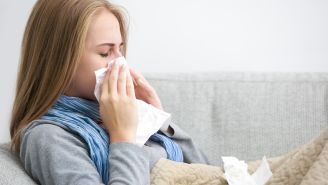Learn the best time to get your flu shot—and 5 other important facts
Get the facts—and avoid common myths—so you can avoid getting the flu this season.
Updated on September 24, 2024

Flu season typically begins in October and lasts until May, though most illnesses usually occur between December and February. Each season, there are between 9 and 41 million individual cases, according to the Centers for Disease Control and Prevention (CDC). Despite those high numbers, there remain a lot of myths and misunderstandings surrounding the flu virus.
Here are… Show More
Flu season typically begins in October and lasts until May, though most illnesses usually occur between December and February. Each season, there are between 9 and 41 million individual cases, according to the Centers for Disease Control and Prevention (CDC). Despite those high numbers, there remain a lot of myths and misunderstandings surrounding the flu virus.
Here are the facts about the flu, so you can stay healthy this season.
Show Less
Only the flu virus can cause the flu
There are only two types of the influenza virus—types A and B—that can cause the seasonal flu. But many people believe the flu can be caused by exposure to weather, bacteria and other factors, says Sarah Park, MD, FAAP, a pediatric infectious disease specialist in Honolulu.
“I’ve heard people… Show More
There are only two types of the influenza virus—types A and B—that can cause the seasonal flu. But many people believe the flu can be caused by exposure to weather, bacteria and other factors, says Sarah Park, MD, FAAP, a pediatric infectious disease specialist in Honolulu.
“I’ve heard people call a stomachache the ‘stomach flu,’ or they have a cold and they’re calling it the flu. Only the flu virus can cause the flu. It’s pretty distinct," Dr. Park says.
Because they share symptoms, it can be hard to tell the difference between a common cold and the flu. Generally, cold symptoms are milder. Having a fever, chills, and muscle or body aches often indicates the flu. Contact a healthcare provider if you have these symptoms and are:
- Pregnant
- Older than 65
- Have a chronic illness
- Have a weakened immune system
It’s important for these high-risk groups to seek medical care to avoid potential complications.
Show Less
Everyone is susceptible to the flu
Though eating a healthy diet, exercising, and getting plenty of sleep are key to well-being, they won’t necessarily protect you from catching the flu. No type of person is more or less likely to get the flu virus, but some people are more likely to contract a more severe infection than others. “… Show More
Though eating a healthy diet, exercising, and getting plenty of sleep are key to well-being, they won’t necessarily protect you from catching the flu. No type of person is more or less likely to get the flu virus, but some people are more likely to contract a more severe infection than others. “People with underlying respiratory conditions, like asthma, can have more complications related to the flu or have a prolonged bout of the flu,” says Dr. Park.
People who are healthy, overall, can generally bounce back after contracting the flu. But those with underlying conditions, or people in higher-risk groups, such as pregnant people, older people, or those living with chronic illnesses, may require hospitalization, antiviral medications, or additional treatments.
Show Less
Vaccines don’t cause the flu
There are two ways to be immunized against the flu. The first is a shot. The second is a nasal spray
The flu shot can cause side effects like soreness and swelling at the site of injection, headache, and nausea, but it cannot cause the flu. Vaccines contain inactivated virus—so they’re no longer… Show More
There are two ways to be immunized against the flu. The first is a shot. The second is a nasal spray
The flu shot can cause side effects like soreness and swelling at the site of injection, headache, and nausea, but it cannot cause the flu. Vaccines contain inactivated virus—so they’re no longer infectious—or components that look similar to the flu virus, so your immune system is ready when it encounters the real thing.
“[The flu vaccine] should not make you sick because the protein in it cannot make you sick. It’s more likely that you were infected waiting in line at the doctor’s office or pharmacy. It takes two weeks before immunity [from the vaccine] is fully developed, so if you’re exposed to someone contaminated in that time, you’re going to get sick," Dr. Park says.
The flu nasal spray is available for people between the ages of 2 and 49, though there are some groups who shouldn’t receive it, like pregnant people and those with certain health issues. Ask a healthcare provider (HCP) if it’s the right decision for you.
Show Less
You can take steps to prevent the flu
The best thing one can do to prevent catching the flu—and many other diseases—is practicing proper hand washing, says Park. Remember: Lather up and scrub the fronts and backs of your hands, between your fingers, and under your fingernails for at least 20 seconds (or about the time it takes to sing… Show More
The best thing one can do to prevent catching the flu—and many other diseases—is practicing proper hand washing, says Park. Remember: Lather up and scrub the fronts and backs of your hands, between your fingers, and under your fingernails for at least 20 seconds (or about the time it takes to sing “Happy Birthday”). If you don’t have access to soap and water, use hand sanitizer that contains at least 60 percent alcohol. You can also help prevent flu transmission by avoiding close contact with people who have the flu and avoiding touching your eyes, nose, and mouth.
If you already have the flu, stay home to protect those around you in your community. You can help prevent spreading the virus by keeping yourself away from others.
Show Less
People with egg allergies can be vaccinated
Because the flu vaccine contains trace amounts of egg proteins, it used to be recommended that people with egg allergies not be vaccinated, or they should be monitored for signs of an allergic reaction for up to 30 minutes after receiving the vaccine.
In 2016, however, the Advisory Committee on… Show More
Because the flu vaccine contains trace amounts of egg proteins, it used to be recommended that people with egg allergies not be vaccinated, or they should be monitored for signs of an allergic reaction for up to 30 minutes after receiving the vaccine.
In 2016, however, the Advisory Committee on Immunization Practices (ACIP) updated its guidelines for people with egg allergies.
- There’s no longer a 30-minute monitoring period for those who have experienced mild allergic reactions, such as only hives, after a flu shot
- Those who have had serious allergic reactions after a flu shot, such as swelling or difficulty breathing, should receive their vaccine in a doctor’s office equipped to manage severe allergic responses
- Those who have had severe allergic reactions after a flu shot shouldn’t be vaccinated
Be sure to talk to your doctor or pharmacist about any previous allergic reactions you’ve had to the flu shot, including side effects (like hives or difficulty breathing) and the duration of your reaction.
Show Less
There is a right time to get vaccinated
When is the best time to receive your flu vaccine? It is possible to catch the flu at any time of the year, but it is best to be vaccinated early in the flu season, which generally starts in October.
It can take up to two weeks for full immunity to develop after being vaccinated. So, try to… Show More
When is the best time to receive your flu vaccine? It is possible to catch the flu at any time of the year, but it is best to be vaccinated early in the flu season, which generally starts in October.
It can take up to two weeks for full immunity to develop after being vaccinated. So, try to visit your pharmacy or healthcare provider to get your flu shot sometime in October.
Show Less
Centers for Disease Control and Prevention. Influenza (Flu): Flu Season. Reviewed September 20, 2022.
Centers for Disease Control and Prevention. Flu Burden: Facts About Estimated Flu Burden. August 14, 2024.
Centers for Disease Control and Prevention. Influenza (Flu): Types of Influenza Viruses. Reviewed March 30, 2023.
Centers for Disease Control and Prevention. Influenza (Flu): Cold Versus Flu. Reviewed September 29, 2022.
Centers for Disease Control and Prevention. Influenza (Flu): People at Higher Risk of Flu Complications. Reviewed August 25, 2023.
Centers for Disease Control and Prevention. Influenza (Flu): Live Attenuated Influenza Vaccine [LAIV] (The Nasal Spray Flu Vaccine). Reviewed August 25, 2022.
Mayo Clinic. Flu shot: Your best bet for avoiding influenza. September 22, 2023.
Centers for Disease Control and Prevention. Influenza (Flu): Preventive Actions to Help Protect Against Flu. Reviewed March 21, 2024.
Centers for Disease Control and Prevention. Influenza (Flu): Flu Vaccine and People with Egg Allergies. Reviewed August 25, 2023.
Armstrong, C. ACIP Updates Influenza Vaccination Recommendations for 2016–2017. Am Fam Physician. 2016;94(8):668-671.
U.S. Food & Drug Administration. It’s a Good Time to Get Your Flu Vaccine. August 14, 2024.
More On


video

article

slideshow


video


video
